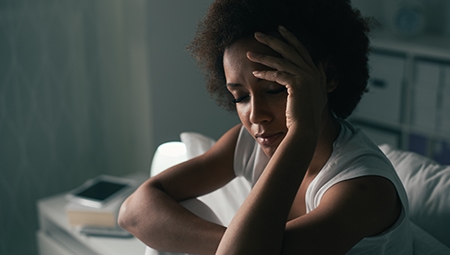
The first step to better sleep is understanding what type of insomnia you might have.
What is Insomnia?
Insomnia is a catch-all term for conditions that make it difficult to initiate and maintain high-quality sleep. Insomnia causes individuals to not get enough quality sleep, which in turn can drain your energy, affect your mood, decrease your work performance, or make it hard to get through the day.
Over time, if not treated, insomnia can cause larger health issues like hypertension, diabetes, obesity, and depression.[1]
What Causes Insomnia?
The causes of insomnia are often complex and multifactorial, so it can be difficult to pin down exactly what might be causing it for any given person. However, sleep research has shown that there are a few consistent themes that play into insomnia:
- Stress: when we are stressed, our bodies release hormones like cortisol that increase our heart rate and blood pressure. Although these stress hormones can be helpful in many circumstances to keep us alert and awake, they can be a hindrance when you’re trying to fall asleep.[2] Whether acute or chronic, stress can be a contributor to insomnia.
- Inconsistent Sleep Schedule: having a bedtime that fluctuates wildly from night to night can contribute to insomnia. It’s common to experience insomnia relating to your sleep schedule when flying across multiple time zones (jet lag) or working overnight.[3] Insomnia can be triggered by an inconsistent sleep schedule when your body’s internal clock is out of sync with your actual sleep schedule.
- Other Lifestyle Habits: things like late naps, afternoon or evening caffeine intake, electronics before bed, and bad sleep hygiene can all contribute to insomnia.
The Types of Insomnia
- Acute insomnia. This short-term insomnia, sometimes called adjustment insomnia, can last anywhere from a few days to a few weeks.[4] It can be triggered by intense periods of stress; environmental factors that disrupt your sleep, like light or noise; new surroundings, like a hotel room or a new mattress; or physical discomfort like pain. Certain medications can also sometimes cause acute insomnia. Adjustment insomnia is typically defined as lasting for less than three months. Most people experiencing insomnia fall into this category. However, sometimes acute insomnia can develop into chronic insomnia.
- Chronic insomnia. If you have trouble sleeping a few days a week for at least a month, you may be experiencing chronic insomnia.[5] Primary chronic insomnia doesn’t have an obvious cause or medical condition associated with it. Secondary chronic insomnia, however, often occurs alongside another condition. Some conditions that may cause secondary chronic insomnia are diabetes, depression, hyperthyroidism, or sleep apnea.
- Onset insomnia. This form of insomnia causes individuals to have trouble initiating sleep. People often report tossing and turning for at least 30 minutes without being able to fall asleep. According to a study, people with this form of insomnia also experience other sleep disorders like restless leg syndrome.[6]
- Maintenance insomnia. This form of insomnia describes an inability to stay asleep through the night.[7] People may find themselves waking up too early and struggling to fall back to sleep. Not being able to fall back asleep easily can also cause additional stress around not getting enough sleep. As with other forms of insomnia, some mental health conditions like depression can contribute. However, waking up in the middle of the night can also be caused by other conditions like sleep apnea or restless leg syndrome.
- Behavioral Insomnia of Childhood. Sometimes referred to as BIC, this insomnia affects around a quarter of children. There are three types of BIC, which can cause children to have difficulty going to sleep. Some contributing factors are negative associations with sleep, only being able to sleep in very specific conditions, or not having enough limits set by adult caretakers. [8]
Treating Insomnia
Getting a good night’s sleep is an important part of living a healthy lifestyle. Battling insomnia can be frustrating, but treatment is possible. Approaches to treating insomnia vary depending on the type of insomnia you have. Acute insomnia can sometimes be treated simply by managing symptoms of stress, for instance. Chronic insomnia, caused by sleep apnea, might be managed with sleep equipment to help address the underlying issue. Other forms of chronic insomnia may require more intervention.
If your insomnia is getting in the way of your life—lasting a few weeks or making it difficult to go through your daily route—it’s best to talk to your doctor to explore all of the options available to you. Treating insomnia is the best way to get back to a satisfying sleep schedule and a healthier lifestyle.
[1] Sleep Disorders and Sleep Deprivation: An Unmet Public Health Problem




